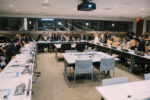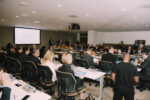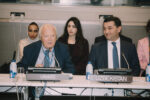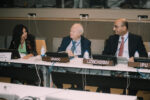Remarks by Under-Secretary-General Miguel Moratinos,
High Representative for the United Nations Alliance of Civilizations
at the High Level Panel Discussion on
“Promoting Peaceful and Inclusive Societies for Sustainable Development through Intercultural and Interreligious Dialogue”
26 September 2024 – 11:00-12:00, CR 12, UNHQ
Your Excellency Mr. Bakhtiyor Saidov, Minister of Foreign Affairs of Uzbekistan,
Your Excellency Mr. Martin Chungong, Secretary-General of the Inter-Parliamentary Union,
Excellencies, Distinguished panelists, Ladies and gentlemen,
It is a great honor to be here, and I thank the Permanent Mission of the Republic of Uzbekistan for co-organizing with the United Nations Alliance of Civilizations this high-level panel.
Our discussion today focuses on a very timely issue: how can we foster peaceful and inclusive societies through intercultural and interreligious dialogue as we chart our path towards sustainable development.
The recent adoption of the Pact for the Future is a landmark moment. The Pact calls on all of us to strengthen multilateralism, defend human rights, and champion the values of peace, justice, and inclusion. It recognizes that to achieve the Sustainable Development Goals, we must focus on fostering social cohesion and addressing the deep-rooted causes of division within and among our societies.
In this context, intercultural dialogue and interreligious dialogue are essential tools. They offer platforms to build bridges of understanding, to challenge stereotypes, and to foster mutual respect. Through dialogue, we create spaces for empathy, where diverse perspectives, whether shaped by culture, faith, or tradition, can be acknowledged and valued.
As globalization draws cultures and beliefs closer together, it also reveals divisions that can lead to misunderstanding, intolerance, and conflict. Dialogue is essential for bridging these divides, fostering mutual respect, and building societies rooted in shared values of peace and dignity. Interreligious dialogue, in particular, plays a unique role in conflict resolution, as faith-based communities can serve as powerful agents of peace, promoting reconciliation and mutual understanding.
The United Nations Alliance of Civilizations, has constantly promoted the power of dialogue as a driver to promote peaceful and inclusive societies. By engaging with youth, women, civil society, and faith leaders, and by providing a platform for dialogue, we are strengthening the fabric of our societies, creating resilience against hate speech, violent extremism as conducive to terrorism, and divisive narratives.
Today, as we reflect on the vision laid out in the Pact for the Future, it is clear that inclusive and peaceful societies cannot be built by governments or institutions alone. They require the active participation of all citizens, across cultures, faiths and beliefs. To truly promote sustainable development, we must recognize the importance of the meaningful participation of marginalized communities, and other vulnerable groups. It is only by ensuring that all voices are heard that we can achieve lasting peace.
UNAOC remains steadfast in its commitment to fostering collaboration and broadening avenues for community engagement. We actively work with a diverse spectrum of stakeholders to promote meaningful dialogue and collective action. Through these partnerships, we aim to build inclusive societies and strengthen the global network of actors dedicated to peace, mutual understanding, and sustainable development.
In conclusion, let us be reminded that dialogue is not a one-time event but a continuous process. A process that that requires persistence, commitment, and courage.
As we move forward with the implementation of the 2030 Agenda for Sustainable Development and Pact for the Future, let us reaffirm our commitment to the essential role of intercultural and interreligious dialogue, and to the vision of a world where all can live with dignity, mutual respect, and opportunity.
I thank you.




